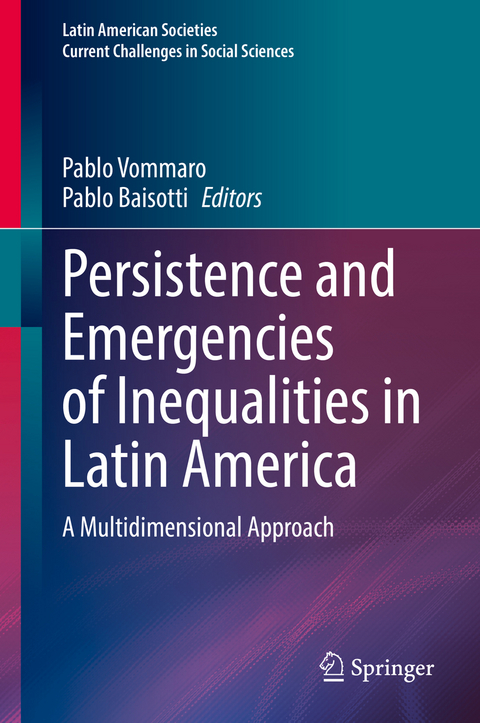
Persistence and Emergencies of Inequalities in Latin America
Springer International Publishing (Verlag)
978-3-030-90494-4 (ISBN)
This book adopts a multidimensional approach to analyze both the historical and emerging factors that contribute to make Latin America and the Caribbean the most unequal region in the world. Social inequality is a historical characteristic of the region, but at the beginning of the 21st century, a handful of progressive governments seemed to be adopting policies that could reduce this historical trend. Many of these efforts, however, were blocked or reversed by the COVID-19 pandemic, which both exposed the persistence of historical trends and contributed to the emergency of new forms of inequality in the region.
The different chapters in this contributed volume adopt a multidimensional, intersectional, perspective to analyze both the persistence and the emergency of social devices of production and reproduction of inequalities in the diverse Latin American and Caribbean temporal spatialities. The issues analyzed in the different chapters revolve around four main axes: a) persistence of generational and intergenerational inequalities; b) structural gender inequality; c) intertwined social inequalities: race, class and social structure and; c) historical and economic dimension of inequality.
Persistence and Emergencies of Inequalities in Latin America: A Multidimensional Approach will be of interest to researchers interested in the study of social inequality and social justice in different fields of the human and social sciences, such as sociology, political science, history, economics, anthropology and education. It will also be a valuable tool for policy makers and social activists engaged in the discussion, advocacy and implementation of public policies aimed at reducing social inequalities.
lt;p>Pablo Vommaro is a Professor of History and Ph.D. in Social Sciences at the University of Buenos Aires (UBA). Post-Doctorate in Social Sciences, Children and Youth. He is a researcher at the National Council of Scientific and Technical Research (Conicet) and co-coordinator of the Group for the Study of Policies and Youth (GEPoJu) at the Gino Germani Research Institute (UBA). He is a member of the working group "Youth, children: policies, cultures and social institutions" of the Latin American Council of Social Sciences (CLACSO). He is the Director of the Book Collection "Las juventudes argentinas hoy" (Buenos Aires: GEU) which has 39 books published between 2015 and 2021.
Pablo Baisotti received his Ph.D. in Politics, Institutions and History from the University of Bologna School of Political Science in 2015. Before that he received an M.Phil. in International Relations Europe-Latin America from the University of Bologna in 2008 and an M.A. in Law and Economic Integration from the Universidad Paris I Pantheon Sorbonne and University of Salvador in 2007. He received his Bachelor's degree in History from the University of Salvador in 2004. He was Fellow Researcher at the University Sun Yat-sen in China and Full-time Research Fellow at the Maria Sibylla Merian Center, University of Costa Rica. He is currently Associate external Researcher at the University of Brasilia (Department of Latin American Studies). He has published and edited more than 20 books.
1.Introduction.- 2.The third moment of equalization in Latin America: Lights and shadows of the progressive governments at the beginning of the 21st century.- 3.The Impact of the Pandemic on Latin America: Social Setbacks and Rising Inequalities.- 4.Past and present of Higher Education in Latin America and Europe: The impact of neoliberal modernization.- 5.Types of Institutions and Youth School Experience: Dynamics of Inequality in Argentine Secondary Education.- 6.Gendered Necropolitcs: Inequalities and Femicides in Central America.- 7.Care, gender and social inequalities.- 8.Actions to promote gender equality in the context of COVID-19.- 9. It all happens (to us) at once: Youth, precariousness and policy in Argentina (A multidimensional approach to inequality).- 10.Racial Inequalities as a Structural Axis of Social Inequality in Latin America and the Afrodescendant Population.- 11.The most unequal region on the planet? A sociological analysis of the ideas, evaluations and attitudes towards inequality in Latin America and the Caribbean.- 12.Youths and Inequalities: Persistent and Emerging Trends, and Public Policies, In the Time of the Pandemic.- 13.Comparative Analysis of Social Inequalities in the Latin American Labour Market.- 14.The Glyphosate Consensus: rural poverty management and agribusiness in South America during the Pink Tide (1998-2016).
| Erscheinungsdatum | 25.02.2022 |
|---|---|
| Reihe/Serie | Latin American Societies |
| Zusatzinfo | XIII, 275 p. 10 illus. |
| Verlagsort | Cham |
| Sprache | englisch |
| Maße | 155 x 235 mm |
| Gewicht | 587 g |
| Themenwelt | Sozialwissenschaften ► Politik / Verwaltung |
| Sozialwissenschaften ► Soziologie ► Makrosoziologie | |
| Schlagworte | COVID19 • Economic Inequality • Educational inequalities • gender inequalities • Intersectionality • Latin America and Caribbean • Multidimensional Approach • Neodevelopmentalism • Neoliberalism • Poverty • racial inequalities • Social Inequality • Social Justice • Youth and Inequalities |
| ISBN-10 | 3-030-90494-6 / 3030904946 |
| ISBN-13 | 978-3-030-90494-4 / 9783030904944 |
| Zustand | Neuware |
| Informationen gemäß Produktsicherheitsverordnung (GPSR) | |
| Haben Sie eine Frage zum Produkt? |
aus dem Bereich


